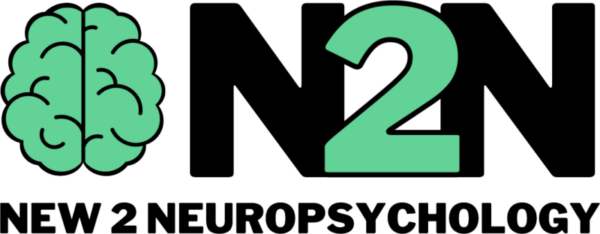N2N Student Liaisons
N2N student liaisons are current neuropsychology trainees involved in leadership roles across professional neuropsychology organizations. They are available to meet with you for 1-2 meetings to:
- Introduce you to neuropsychology and discuss your related interests
- Answer specific questions about how to prepare for a career in neuropsychology
- Connect you with additional resources (including finding a long-term mentor who would be a good fit for you)
Read their bios below to find someone you’d be interested in talking to further.
Student Liaison Bios:
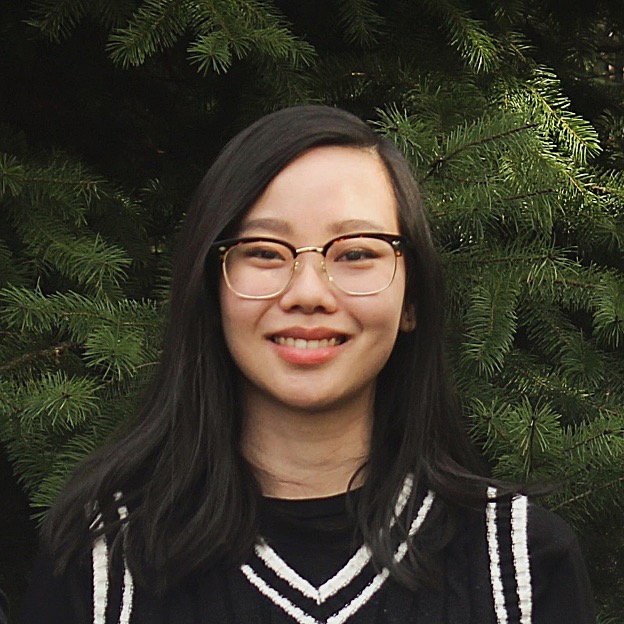 Alison’s Story:
Alison’s Story:
Being raised primarily by her grandparents, lapses in memory and troubles with mental health were not uncommon in her household. As she grew to recognize these difficulties, as well as her desire to help individuals in similar circumstances, clinical neuropsychology increasingly became a field of interest. She is particularly interested in subjects including chronic illness, neurodegenerative conditions, and cognitive aging. As a person of colour, a first-generation student, and a person with lived experience with mental illness and disability, she also understands the need to address inequalities within both academia and the healthcare system at large. As such, she strives to assist students of all backgrounds in achieving their aspirations.
Fun Fact: Alison participated as a main-roster member of a women’s only esports team during her first year of graduate school.
Professional Interests:
- Working with adults and older adults experiencing chronic illness and/or cognitive decline
- Adult psychoeducational assessment
Education:
- University (Bachelor’s degree): Simon Fraser University
- Graduate School (MSc-PhD): University of Victoria
Current Organizational Affiliations:
- Project Students for Higher Education Opportunities and Representation in Training
- Alzheimer’s Association International Society to Advance Alzheimer’s Research and Treatment
- New2Neuropsychology
- Asian Neuropsychological Association
- American Psychological Association
- Women in Cognitive Sciences Canada
- Canadian Psychological Association
Good Topics for Consultation:
- Navigating graduate school as a marginalized student
- Applying to clinical neuropsychology programs in Canada
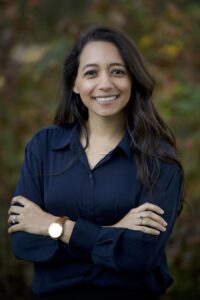
Andrea’s Story:
Andrea’s interest in brain and behavior started in undergrad when she joined a cross cultural neuropsychology lab. Through various experiences, she grew to appreciate an integrated and culturally sensitive approach in understanding a person’s cognitive functioning. In addition to all the things that Andrea loves about her clinical and research activities, she also appreciates that her job is never boring and never feels monotonous. In her spare time, she spends her time outdoors with her 1-year-old son.
Fun Fact: Andrea was introduced to the field of neuropsychology by her older sister, who is also on the journey of becoming a clinical neuropsychologist.
Professional Interests:
- Cognitive aging
- Cognitive reserve
- Rehabilitation
- Health equity
Education/Training Locations:
- College (BA): University of North Carolina Wilmington
- Graduate School (MA): University of North Carolina Wilmington
- Graduate School (PhD): University of Florida
- Internship: James A. Haley Veterans’ Hospital
- Residency: James A. Haley Veterans’ Hospital
Good Topics for Consultation
- Applying to grad school and internship
- Networking
- Training at an academic medical center and/or VA
- Balancing professional and personal identity a new parent
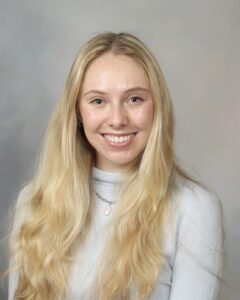
Carly’s Story:
Carly is a first year Clinical Psychology Ph.D. student at Washington University in St. Louis with specializations in Neuropsychology and Neuroimaging. Carly’s research is focused on utilizing neuroimaging techniques and neuropsychological assessments to study Alzheimer’s disease (AD), specifically sex differences in AD. Her long-term career goal is to become a clinical neuropsychologist that integrates research and clinical practice to positively impact patient care, prognosis, and overall health and well-being. Carly received her B.A. from Baylor University in December of 2021 where she worked as a research assistant in the Behavioral Medicine Laboratory for 3 years. During Carly’s junior year at Baylor, she participated in a summer undergraduate research fellowship program at the Mayo Clinic in Rochester, MN, where she conducted research on atypical presentations of AD. After completing her undergraduate education Carly returned to Mayo Clinic as a post baccalaureate student where she broadly conducted research on neurodegenerative diseases including AD and atypical AD. Carly grew up in Aspen CO, a small ski town in the middle of the mountains. She is passionate about the outdoors and loves to go hiking, running, and camping.
Professional Interests:
- Working with older adults experiencing neurodegenerative disorders and/or cognitive decline
- Bench to bedside approaches to neuropsychology
- Health disparities
Education/ Training Locations:
- College (Bachelor’s Degree): Baylor University
- Post-baccalaureate: Graduate Research Employment Program (GREP) at Mayo Clinic in Rochester, MN
- Graduate school (PhD ): Washington University in St. Louis
Good Topics for Consultation:
- Applying to clinical psychology and clinical neuropsychology graduate programs in the United States
- Apply to and finding post-baccalaureate programs
- Navigating graduate school as an LGBTQIA+ student
- Multidisciplinary approaches to neuropsychology and what neuropsychology looks like in an academic healthcare system
- Research and clinical practice in neuropsychology
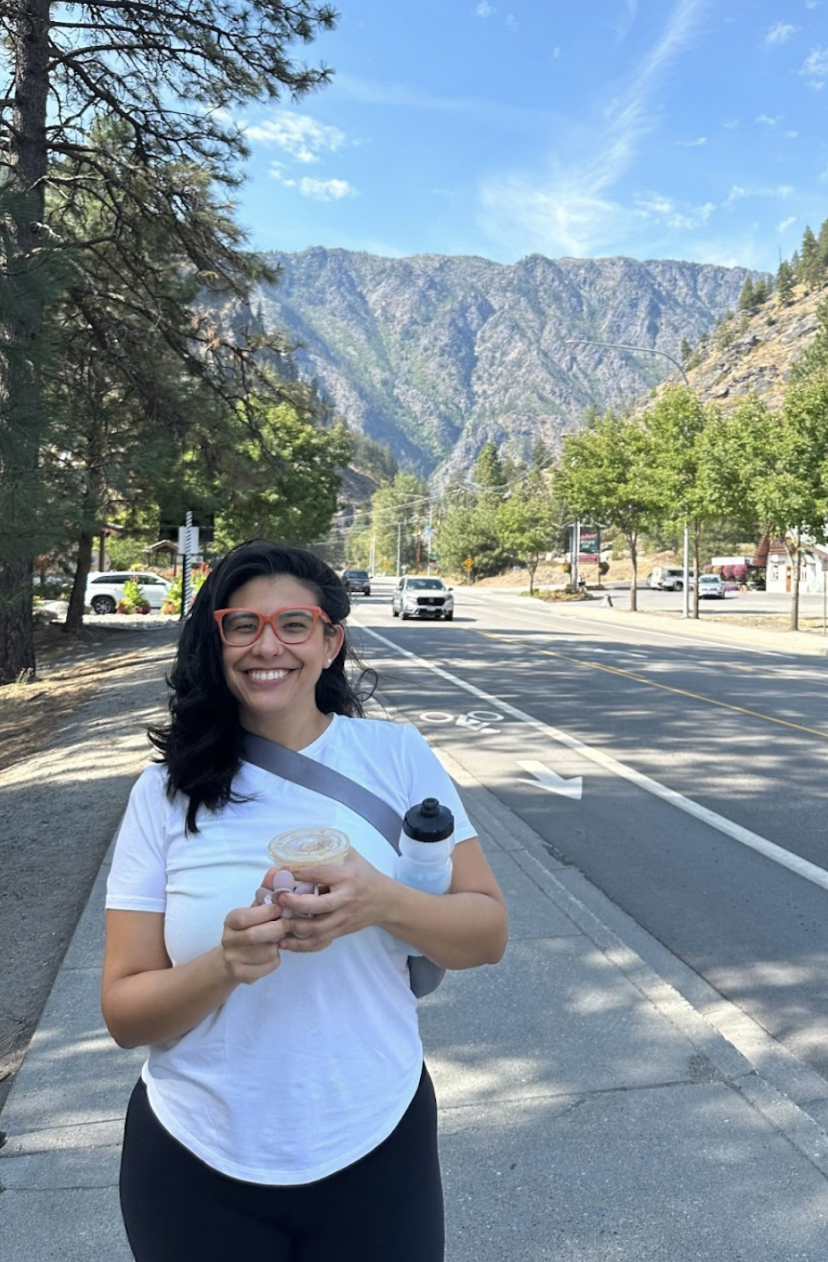 Karen’s Story:
Karen’s Story:
Dr. Karen A. Dorsman earned her Ph.D. in Clinical Psychology at the University of Texas Southwestern Medical Center in Dallas, and is currently completing a pediatric neuropsychology fellowship through Children’s Medical Center and UT Southwestern Medical Center in Dallas. Her primary areas of interest include developmental disorders across the lifespan and culturally responsible neuropsychological evaluations. She is also passionate about multidisciplinary research focused on brain health inequities, and being your authentic self in academia. In her free time, Dr. Dorsman enjoys dancing, walking, weightlifting, and spending quality time with friends.
Fun Fact: Karen is a dancer at heart. When she lived in the Bay Area, California, she danced with the group “Chavalos: Danzas por Nicaragua.”
Professional Interests:
- Working with children and adults with neurodevelopmental disorders
- Health equity
- Cultural responsiveness
Education/Training Locations:
- College (Bachelor’s degree): Universidad Católica del Uruguay
- Graduate School (PhD): UT Southwestern Medical Center
- Internship Year: UT Southwestern Medical Center
- Postdoctoral Fellowship: Children’s Medical Center in Dallas
Good Topics for Consultation:
- What is the difference between mentorship and sponsorship, and how do I find those resources?
- How do you make the most out of supervision?
- Navigating fellowship applications
 Maddy’s Story:
Maddy’s Story:
Maddy is a third-year doctoral student in clinical psychology at the University of Denver. Her interest in understanding the relationship between the brain and behavior began after joining a research lab studying traumatic brain injury in incarcerated populations during her master’s program in forensic psychology. She is particularly interested in neuropsychological assessment within rehabilitation settings for individuals with brain, spinal cord, and polytraumatic injuries, as well as neurodegenerative disorders. She is also hoping to continue her work with vulnerable populations, specifically veterans and individuals involved in the criminal legal system. Maddy is excited to continue integrating clinical work, research, leadership, and mentorship within the field of neuropsychology as a N2N Student Liaison. Maddy grew up in Denver, CO and outside of school, she loves to do yoga and play with her dog, Mac (named after the band Fleetwood Mac).
Professional Interests:
- Rehabilitation neuropsychology
- Acquired brain injury and polytrauma
- Neuropsychological assessment with military and forensic populations
Education/Training:
- College (BA in Psychology): University of Colorado Boulder
- Graduate School (MA in Forensic Psychology): University of Denver
- Graduate School — Current (PsyD in Clinical Psychology): University of Denver
Current Organizational Affiliations:
- Association of Neuropsychology Students & Trainees (ANST) — Division 40, Society for Clinical Neuropsychology
- Student Leadership Network (SLN) — Division 22, Rehabilitation Psychology
- Asian Neuropsychological Association
- American Psychological Association of Graduate Students
- New2Neuropsychology
Good Topics for Consultation:
- Training in rehabilitation hospitals, academic medical centers, or other medical settings
- Applying to graduate school for clinical psychology (PsyD vs. PhD)
- Balancing research, clinical work, and leadership in graduate school
- Navigating the intersection between rehabilitation and neuropsychology
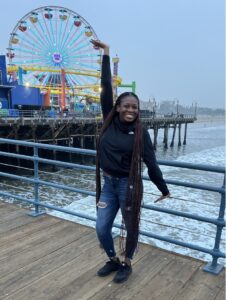
Moyo’s Story:
Moyo’s path through the neuropsychology field is an unforgettable one! She inadvertently learned about neuropsychology in her junior year in undergrad through a list of internship sites she had to choose from, for a capstone course. Moyo applied to a neuropsychology clinic and two other general mental health sites, not knowing what to expect. She ended up going with the neuropsychology site, and it was one of the best decisions she ever made. Through this experience, she enjoyed observing neurobehavioral exams and conducting neuropsychological assessments with older adults with dementia diagnoses and prognoses. The experience then led her to seek graduate school opportunities to begin her neuropsychology journey. She has been able to develop her interests to know she wants to work with older adults with neurological disorders. In her free time, Moyo enjoys binge-watching shows regardless of genre. However, she particularly enjoys comedy shows like The Office, Modern Family, Parks and Rec, Brooklyn Nine-Nine, etc.
Fun Fact: If she did not go into neuropsychology, Moyo would probably go to med school to be a neurosurgeon, stating “I just love the brain!”
Professional Interests:
- Working with older adults with Alzheimer’s Disease and Related Dementias (ADRDs) as well as other neurological disorders
- Functional connectivity
- Racial/ethnic disparities
Education/Training Locations:
- Bachelor’s in Psychology: West Virginia University
- Master’s degree in Clinical Mental Health Counseling: West Virginia University
- Doctoral student in Clinical Psychology (PhD): Wayne State University
Current Organizational Affiliations:
- Association for Neuropsychology Students and Trainees (ANST)
- Gerontological Society of America (GSA)
- Society for Black Neuropsychology (SBN)
- International Neuropsychological Society (INS)
- American Counseling Association (ACA)
Good Topics for Consultation:
- Tips for applying to/navigating graduate school
- Conversations about graduate school application as an international student/a minority student
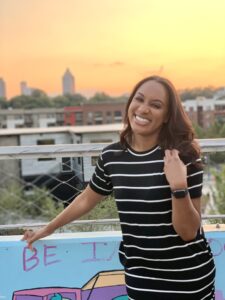
Ronnise’s Story:
After constantly juggling between the idea of medical school vs. a clinical psychology program, Ronnise began her journey with the intention of becoming a pediatric psychologist. However, this quickly changed when she was introduced to assessment and had her first practicum experience in a neuropsychology department at a children’s academic medical center. It was as if her two loves collided, medicine and psychology in the most unique way. Ronnise often says, “I love neuropsychology because I get to be a detective, constantly trying to help solve questions to better help families make sense of their child’s weaknesses related to their medical diagnosis.” She also enjoys incorporating intervention for children with medical conditions to help them conquer day to day life challenges. In the community, Ronnise is involved in community advocacy to decrease stigma within minority communities. In her personal life, Ronnise loves fitness, ice cream, and watching crime shows. She enjoys spending time with her friends, family, and trying out new restaurants.
Professional Interests:
- Working with children with medical conditions
- Working in a pediatric rehabilitation setting
- School and community health disparities impacting children
Education/Training Locations:
- College (Bachelor’s degree): Spelman College
- Graduate School (MPH): Mercer University
- Graduate School (PsyD): Mercer University (current student)
- Internship: Nationwide Children’s Hospital at the Ohio State University (current)
- Postdoctoral Fellowship: Emory Department of Rehabilitation Medicine
Good Topics for Consultation:
- Tips for applying to graduate school
- Tips for applying to internship
- Conversations related to being a minority trainee in the field of neuropsychology
- Support in developing your personal and professional identity as a person of color in the field of neuropsychology
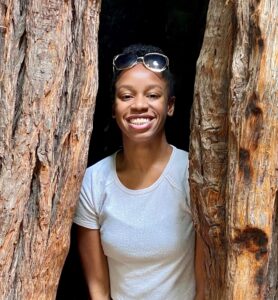 Savannah’s Story:
Savannah’s Story:
Savannah was first introduced to neuropsychology in college when she attended a presentation about the neural correlates of emotional expression in dancers. This piqued her interest in brain and behavior relationships and set her on the course to clinical neuropsychology. In her clinical psychology graduate program, she found an interest in dementia diagnosis through neuropsychological assessment. While Savannah was never particularly interested in becoming a therapist, she found a love for couple’s therapy. As a neuropsychologist she hopes to carry this interest forward to interventions and care for families dealing with challenges related to aging and dementia. In her personal life, Savannah has two cats (Zion and Shuri). She enjoys dancing, lifting weights, hiking, cooking, and music.
Fun Fact: Savannah was a professional ballet dancer between college and Graduate school.
Professional Interests:
- Working with older adults with dementia or other cognitive weaknesses
- Couples and family interventions and supports for coping with cognitive decline.
- Health disparities
Education/Training Locations:
- College (Bachelor’s degree): Pomona College
- Graduate School (PhD): Palo Alto University
- Internship Year: Raymond G Murphey VA Medical Center
- Postdoctoral Fellowship: Michigan Medicine at University of Michigan
Good Topics for Consultation:
- What does neuropsychology look like in community mental health, an academic medical center or VA hospital?
- I’m interested in end of life care, how can neuropsychology fit in?
- I’m interested in therapy and neuropsychology but feel like I have to choose, what do I do?
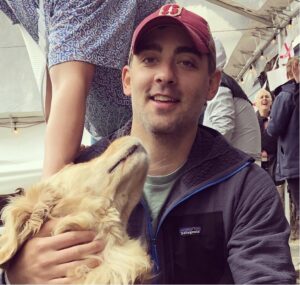
Sohrab’s Story:
After completing my undergraduate internship at a Neuropsychology private practice, I decided to pursue a PhD in Neuropsychology. After graduating, I worked as clinical research coordinator at Stanford University studying mild traumatic brain injury in athletes and also the effectiveness of transcranial brain stimulation for the treatment of anxiety and mood disorders. In my graduate program I continue to study the emotional, cognitive, and sleep correlates of brain injuries.
Professional Interests:
- Traumatic brain injury, emotion regulation, and aging
- Neuropsychological rehabilitation
- Utilizing technology to improve diagnostic and intervention tools
Education:
- Bachelor’s degree: Robert Morris University
- Current PhD program: University of Windsor
Current Organizational affiliation:
- New2Neuropsychology
- International Neuropsychological Society
- Society for Clinical Neuropsychology (APA Division 40)
Good Topics for Consultation:
- Navigating a non-traditional path to applying to graduate programs
- Applying to programs as an international student
- Finding the right supervisor fit
- Taking gap years between undergrad and grad applications
